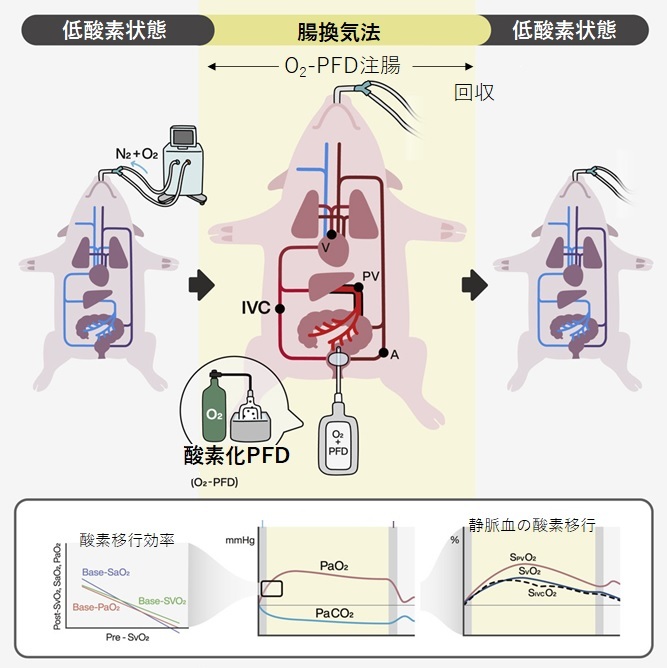週に一度近くの山道を一緒に散歩する友達(私より10歳くらい年上の女性)が、新しい呼吸補助療法の研究の話を教えてくれた。
感染症などで肺呼吸が困難になった場合、人工呼吸器が使われる。これには人的リソースが必要でパンデミックなどで大量の患者が出た場合には、病院機能がパンクしてしまう。これは人工呼吸器に代わると考えられる治療法だ。
実験は
酸素化した液体を、人為的に低酸素血症の状態にした豚のお尻から注入し、30分後、その液体を腸管から回収する
というもの。
その結果
投与中は、低酸素状態の改善だけでなく、二酸化炭素の減少効果(換気効果)
が認められたという。
これが実用化したら、睡眠時無呼吸で夜間に酸素飽和度が下がってしまう義母の病気(多系統萎縮症 MSA)にも効果が見込めるようになるかもしれない?
この話を息子にしたら
「投与中はずっと下痢⚪︎んがお腹にあって、お腹痛い感じ?」
と。。。
上記の友達が、こんなページも紹介してくれた。
13分頃からの話題を、彼女がtranscriptしてくれた。(英語勉強に)
ーーーーーーーーーーーーーーーーーーーーー
Here's the transcript: TAKA TAKEBE: Taka Takebe from Cincinnati Children's Hospital and also Tokyo Medical and Dental University.
MOLLY: A Japanese researcher, and he splits his time between Japan and Ohio.
TAKA TAKEBE: I'm traveling back and forth every month for the past seven years. [laughs]
MOLLY: Every month?
MOLLY: The reason that he did this study was his dad ended up having to go on a ventilator.
TAKA TAKEBE: Maybe six years ago. I think he has a pneumonia condition, and actually hospitalized in ICU situation.
MOLLY: And dad is fine. Dad came off the ventilator. But then COVID happened and everybody was getting slammed on ventilators, and Taka was like, "This does not seem sustainable."
TAKA TAKEBE: I also realized, you know, so we do the same thing as in the past, from 200 years ago.
MOLLY: Really? It was 200 years ago that we developed ventilation?
TAKA TAKEBE: Yeah, exactly.
MOLLY: So he's like, is there another way to get oxygen into the body? So he starts looking at how other animals might do it, and he comes across a fish that ...
TAKA TAKEBE: Is actually taking up the oxygen from the bowel, or from the anus. The butt.
MOLLY: And he thinks, "Hmm, maybe that's another way." And so what he does is he takes some mice and pigs and he puts them in low-oxygen conditions, what's called "hypoxic."
LATIF: Okay.
MOLLY: And he pumps O2 into a tube that is stuck up into their butts.
LULU: Okay.
MOLLY: This doesn't work so well. Their oxygen levels stay about the same.
LULU: Huh.
MOLLY: But then he's like, "What if I take oxygen that's, like, dissolved in a fluid?" So he does it again—tube up the butt, oxygen in a fluid, and what they see is that for these mice and pigs, color and warmth return to their skin and to their extremities in minutes.
LATIF: Wow!
MOLLY: So think of the butt respiration as like an enema that gives you oxygen.
LULU: Wow!
MOLLY: I know!
MOLLY: I was thinking about the fact that we did, like, evolve from fish, and you're in a way tapping into some sort of evolutionary history that lets oxygen exchange in the gut be possible. It's almost like going back to a prior way of being.
TAKA TAKEBE: [laughs] Exactly.
MOLLY: I so wish my skin respirated.
翻訳ーーーーーーーーーーーーーー
TAKA TAKEBE:シンシナティ小児病院と東京医科歯科大学のタカ・タケベです。
MOLLY:日本人の研究者で、日本とオハイオを行き来しています。
TAKA TAKEBE:この7年間、毎月行ったり来たりしています。笑)。
MOLLY: 毎月ですか?
MOLLY: この研究をした理由は、彼のお父さんが人工呼吸器をつけることになったからなんです。
TAKA TAKEBE:6年前かな。肺炎を患っていて、実際にICUに入院していたと思う。
モリー:そしてお父さんは元気です。お父さんは人工呼吸器を外しました。でもCOVIDが起きて、みんなが人工呼吸器をつけられるようになって、タカは "これは持続可能ではないようだ "と思ったんだ。
TAKA TAKEBE:そして、200年前と同じことをやっていることに気づいたんだ。
MOLLY:そうなんですか?換気を開発したのは200年前?
TAKA TAKEBE:ええ、その通りです。
MOLLY: それで彼は、酸素を体内に取り込む別の方法はないかと考えたんです。そこで彼は、他の動物がどのようにしているのか調べ始め、ある魚に出会った。
TAKA TAKEBE: 実際に腸から、つまり肛門から酸素を取り込んでいる。お尻から。
MOLLY: そして彼は、"うーん、これは別の方法かもしれない "と考えた。マウスや豚を低酸素状態、いわゆる "低酸素状態 "に置くんです。
LULU: なるほど。
MOLLY:そして、お尻に刺したチューブに酸素を送り込むの。
LULU: わかったわ。
MOLLY:これはあまりうまくいかないの。酸素濃度はほとんど変わらないのよ。
LULU:へえ。
MOLLY:酸素を液体に溶かしたらどうだろう?すると、マウスやブタの皮膚や四肢に色と温かさが数分で戻ったのです。
LULU: すごい!
MOLLY:お尻呼吸は、酸素を供給する浣腸のようなものだと考えてください。
LULU: わあ!
MOLLY:わかるわ!
私たちは魚から進化してきたわけだけど、あなたはある意味、腸内で酸素交換を可能にする進化の歴史を利用している。それはほとんど、以前の存在に戻るようなものだ。
TAKA TAKEBE:その通りです。
MOLLY: 肌が呼吸してくれたらいいのに。
DeepL.com(無料版)で翻訳しました。
